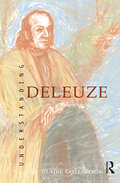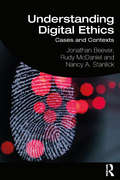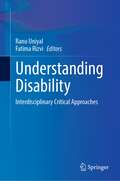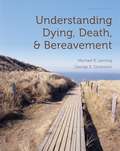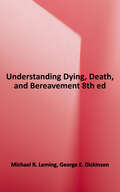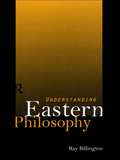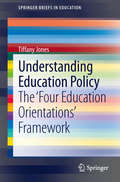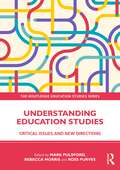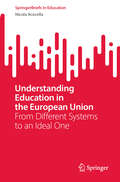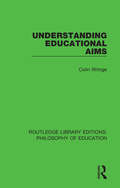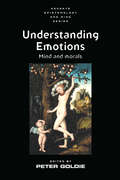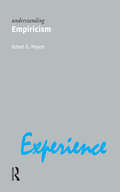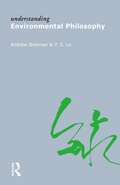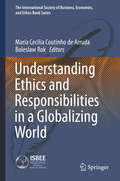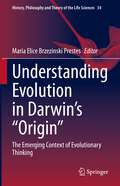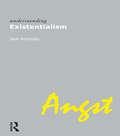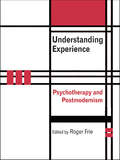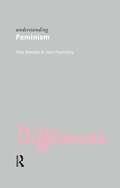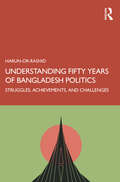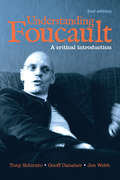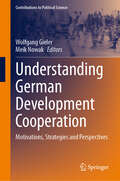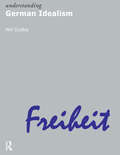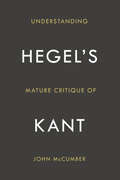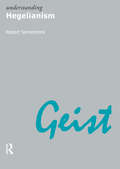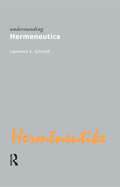- Table View
- List View
Understanding Deleuze
by Claire Colebrook'The best introduction to Deleuze, and to the collective writings of Deleuze and Guattari, available yet! Claire Colebrook has produced a truly accessible pathway into the labyrinthine enchantments offered for contemporary thought by Deleuzianism, making concepts clear, showing their political and theoretical complexity, elaborating their social and artistic relevance. A wonderful, lucid opening onto the new worlds of Deleuze.'Elizabeth Grosz, Rutgers University'A wonderfully clear introduction to key Deleuzian concepts and to their effectiveness in fields ranging from ethics and politics to cinema, literary and cultural studies. Claire Colebrook provides a series of effortless transitions from Deleuze's philosophical concerns (eg: difference, representation, desire and affect) to concrete problems in a variety of fields. This book is an excellent guide to an important body of critical thought.'Paul Patton, Professor of Philosophy, University of NSWA genuine attempt to think differently, Gilles Deleuze's work challenges, provokes and frustrates. Surprisingly practical as well as innovative, it is now being seen as a 'must read' for students and scholars across the humanities and social sciences. Claire Colebrook's Understanding Deleuze offers a comprehensive and very accessible introduction to his work. hink differently. It is built on the notion of an immanent ethics: how can we have a political and ethical theory without some external foundation such as the subject or morality? He argues that the only way we can do this is with a theory of the virtual, and he sees all life (not just cyberculture) as virtual. Deleuze goes further than Foucault or Derrida in questioning the boundaries of the subject and knowledge. For Deleuze perception extends beyond the human, to animals, machines and microorganisms.Deleuze's writing is challenging and hard to read, and so far there is no introduction to his work. Claire Colebrook's primer offers an accessible introduction to the whole Deleuzian oeuvre, including the work he did with Guattari.
Understanding Digital Ethics: Cases and Contexts
by Nancy A. Stanlick Rudy McDaniel Jonathan BeeverRapid changes in technology and the growing use of electronic media signal a need for understanding both clear and subtle ethical and social implications of the digital, and of specific digital technologies. Understanding Digital Ethics: Cases and Contexts is the first book to offer a philosophically grounded examination of digital ethics and its moral implications. Divided into three clear parts, the authors discuss and explain the following key topics: • Becoming literate in digital ethics • Moral viewpoints in digital contexts • Motivating action in digital ethics • Speed and scope of digital information • Moral algorithms and ethical machines • The digital and the human • Digital relations and empathy machines • Agents, autonomy, and action • Digital and ethical activism. The book includes cases and examples that explore the ethical implications of digital hardware and software including videogames, social media platforms, autonomous vehicles, robots, voice-enabled personal assistants, smartphones, artificially intelligent chatbots, military drones, and more. Understanding Digital Ethics is essential reading for students and scholars of philosophical ethics, those working on topics related to digital technology and digital/moral literacy, and practitioners in related fields.
Understanding Disability: Interdisciplinary Critical Approaches
by Ranu Uniyal Fatima RizviThis edited volume brings together contributions on disability studies organized around two themes: literary and sociological aspects. The contributors include academics, disability activists, and researchers from within and outside the Indian periphery. While the book strengthens the disability discourse and contributes to building academic scholarship on this subject, it also promotes disability activism by giving space to both direct practitioners and persons with disabilities. The chapters discuss various analytical and literary aspects of the marginalization experienced by the disabled community and bring forth new and elaborate perspectives. It draws connections across multiple identities and includes personal narratives across nations, cultures and societies. It is an excellent research resource on disability studies in India for scholars and students in the area of humanities, education, law, sociology and social work, while at the same time also addressing the global context.
Understanding Dying, Death, and Bereavement
by Michael R. Leming George E. DickinsonUsing a social-psychological approach, this edition remains solidly grounded in theory and research, but places greater emphasis on the individual and coping with death and dying. These two well-known authors and researchers integrate stimulating personal accounts throughout the text, and apply concepts to specific examples that deal with cross cultural perspectives and the practical matters of death and dying.
Understanding Dying, Death, and Bereavement
by Michael R. Leming George E. DickinsonUsing a social-psychological approach, the new edition of this book remains solidly grounded in theory and research, while also providing useful information to help individuals examine their own feelings about-and cope with-death and grieving. The well-known authors and researchers integrate stimulating personal accounts throughout the text, and apply concepts to specific examples that deal with cross-cultural perspectives and the practical matters of death and dying.
Understanding Eastern Philosophy
by Ray BillingtonUnderstanding Eastern Philosophy provides an accessible critical introduction to how some of the key philosophies of the East compare with those in the West. Starting from a discussion of the problems of distinguishing between religions and philosophies, Ray Billington presents a clear picture of the key tenets behind Hinduism, Buddhism, Taoism, Jainism and Confucianism.Moving on to compare the key themes of religious philosophy that cut across East and West, such as a belief in God, the soul, moral decision-making, nature and authority, Understanding Eastern Philosophy presents a fascinating and controversial picture of the contribution theistic religions have to make. With its belief in a personal God bestowing a particular version of 'truth', Ray Billington concludes that the universal mysticism characteristic of Eastern thought provides a more realistic and rewarding path than is commonly supposed in the West.Understanding Eastern Philosophy assumes no prior knowledge of religion or philosophy.
Understanding Education Policy
by Tiffany JonesAnalysis of education policy often follows a particular orientation, such as conservative or neo-liberal. Yet, readers are often left to wonder the true meaning and conceptual framing behind these orientations. Without this knowledge, the policy analysis lacks true rigor, its value is diminished as the results may prove difficult to reproduce. Understanding Education Policy provides an overarching framework of four key orientations that lie beneath much policy analysis, yet are rarely used with accuracy: conservative, liberal, critical and post-modern. It details each orientation's application to policy making, implementation and overall impact. The book also argues the value of analysing a policy's orientation to improve the clarity of its analysis and allow broader trends across the education policy field to emerge. The book offers practical examples, key vocabulary and reflection activities which give equitable, yet critical consideration to all education orientations. This allows readers to see the benefits and disadvantages of each perspective and discover their own biases. This introduction to education policy analysis offers theoretically broad, highly practical coverage. It is adaptable to many kinds of policy analysis areas and will appeal to a wide range of readers with an interest in education policy, from students conducting specific research to policy makers looking for a deeper way to re-think their work.
Understanding Education Studies: Critical Issues and New Directions (The Routledge Education Studies Series)
by Mark PulsfordThis book explores undergraduate education programmes in a new way. Written by those at the forefront of teaching and learning, it encourages students to delve beneath the surface of their degree subject and reveals important insights about the how, why and where next for education studies. With contributions from course leaders, tutors, current students and recent graduates, this book offers insights from nearly 60 authors based in 20 different institutions from five different countries. The chapters offer opportunities for readers to consider their own learning experiences in a wider context, enhance their understanding of the degree course and actively shape the education studies community of the future. Each chapter is written in an accessible way, with ‘questions to consider’ throughout and ‘recommended readings’ at the end to advance readers’ thinking and reflections. Chapters cover topics such as: Education Studies’ development as a degree subject Its evolving identity, values and purposes Teaching and assessment approaches in undergraduate education programmes How the subject develops students’ professional aptitudes and transferable skills Possibilities for advancing inclusion, equity and justice in education at degree level These ‘behind the scenes’ factors are brought to the fore through case studies and examples of how lecturers and students make sense of their teaching and learning. With its unique approach to examining these issues, this book is essential for students of Education Studies at undergraduate level while also being relevant for staff and postgraduate students in education.
Understanding Education in the European Union: From Different Systems to an Ideal One (SpringerBriefs in Education)
by Nicola AcocellaThis book examines the importance of education in the European context, from knowledge acquisition to its instrumental nature. It provides a short history of education of schools around the world before delving into the comparisons of European education systems through exploration of their organization, teaching methods, attendance models and public versus private provision and costs. Additionally, it discusses the existence of NEETs (Not in Education, Employment, or Training) within these systems. Starting with addressing the six dimensions of the European Education Area devised by the Bologna Process, it concludes with identifying a need for a superior education model that accommodates different aspects of education which is not yet satisfactorily achieved by any existing systems, offering insight into an ideal education system. Inviting reflection on the role of education and its future, educators, educational administrators, and those interested in understanding and improving the functioning of schools find this book of great value.
Understanding Educational Aims (Routledge Library Editions: Philosophy of Education #21)
by Colin WringeThis text, first published in 1988, examines the underlying rationale of educational aims as applied to individual pupils, social policies and supposedly intrinsic values. This book explores traditional educational aims such as developing the potential and autonomy of individuals or the promotion of rationality as well as more contemporary and often controversial ones. The author provides a clear and balanced justification of educational aims which teachers need in order to combat the rhetoric of changing fashion or the pressures of political and managerial opportunism. This book is essential reading both for students and teachers.
Understanding Emotions: Mind and Morals (Ashgate Epistemology and Mind Series)
by Peter GoldieUnderstanding Emotions presents eight original essays on the emotions from leading contemporary philosophers in North America and the U.K: Simon Blackburn, Bill Brewer, Peter Goldie, Dan Hutto, Adam Morton, Michael Stocker, Barry Smith, and Finn Spicer. Goldie and Spicer's introductory chapter sets out the key themes of the ensuing chapters: surveying contemporary philosophical thinking about the emotions, and raising challenges to a number of prejudices that are sometimes brought to the topic from elsewhere in the philosophy of mind and moral philosophy. Brewer, Hutto, Goldie and Smith explore the conceptual and epistemological problems of other minds that the emotions raise, and how the emotions can be a source of knowledge of the world around us. The chapters by Stocker, Blackburn and Morton are broadly concerned with issues in morality: Stocker argues for the traditional Aristotelian view that emotions reveal value and are constitutive of value; Blackburn, from a more Augustinian perspective, argues that the virtuous person, like the rest of us, will be emotional but he or she will have the right emotions towards the right objects; Morton questions the idea of emotions and narrative as sources of self-understanding. An extensive bibliography completes the book. Drawing together the arguments of leading contemporary philosophers, focusing on issues in the philosophy of mind, epistemology and moral philosophy, this book offers a wide and deep understanding of the emotions, and will be of interest across the philosophical spectrum to students and researchers of this fascinating and important topic.
Understanding Empiricism (Understanding Movements In Modern Thought Ser.)
by Robert G. Meyers"Understanding Empiricism" is an introduction to empiricism and the empiricist tradition in philosophy. The book presents empiricism as a philosophical outlook that unites several philosophers and discusses the most important philosophical issues bearing on the subject, while maintaining enough distance from, say, the intricacies of Locke, Berkeley, Hume scholarship to allow students to gain a clear overview of empiricism without being lost in the details of the exegetical disputes surrounding particular philosophers. Written for students the book can serve both as an introduction to current problems in the theory of knowledge as well as a comprehensive survey of the history of empiricist ideas. The book begins by distinguishing between the epistemological and psychological/causal versions of empiricism, showing that it is the former that is of primary interest to philosophers. The next three chapters, on Locke, Berkeley, Hume respectively, provide an introduction to the main protagonists in the British empiricist tradition from this perspective. The book then examines more contemporary material including the ideas of Sellars, foundations and coherence theories, the rejection of the a priori by Mill, Peirce and Quine, scepticism and, finally, the status of religious belief within empiricism. Particular attention is paid to criticisms of empiricism, such as Leibniz's criticisms of Locke on innatism and Frege's objections to Mill on mathematics. The discussions are kept at an introductory level throughout to help students to locate the principles of empiricism in relation to modern philosophy.
Understanding Environmental Philosophy (Understanding Movements In Modern Thought Ser.)
by Andrew Brennan Y. S. LoEnvironmental philosophy is one of the exciting new fields of philosophy to emerge in the last forty years. "Understanding Environmental Philosophy" presents a comprehensive, critical analysis of contemporary philosophical approaches to current ecological concerns. Key ideas are explained, placed in their broader cultural, religious, historical, political and philosophical context, and their environmental policy implications are outlined. Central ideas and concepts about environmental value, individual wellbeing, ecological holism and the metaphysics of nature set the stage for a discussion of how to establish moral rules and priorities, and whether it is possible to transcend human-centred views of the world. The reader is also helped with an annotated guide to further reading, questions for discussion and revision as well as boxed studies highlighting key concepts and theoretical material. A clear and accessible introduction to this most dynamic of subjects, "Understanding Environmental Philosophy" will be invaluable for a wide range of readers.
Understanding Ethics and Responsibilities in a Globalizing World
by Maria Cecilia Coutinho de Arruda Boleslaw RokThis book contemplates the ethics of responsibility in a large range of meanings, consequences and impacts. It reflects the perspectives and reasoning of 24 authors from all continents. All chapters are original papers presented at the Fifth World ISBEE Congress, that took place in Warsaw, Poland, at the Kozminski University, on 11-14 of July, 2012. In this book, ethics and responsibility are considered essential traits of character, not only in the business or governmental arenas but in any initiative, decision and activity. The contributions to this book focus on a spectrum of themes, terms and concepts, the global corporate social responsibilities perspective covering impacts, challenges, analysis, criticism, consequences of important topics of real life, sustainability, international economy and regimes, corruption, poverty and violence, among others. The book is intended for academics, researchers and professionals in all continents who are dedicated to Ethics, Business Ethics, Corporate Social Responsibility, Social Innovation, and Sustainability Management.
Understanding Evolution in Darwin's "Origin": The Emerging Context of Evolutionary Thinking (History, Philosophy and Theory of the Life Sciences #34)
by Maria Elice Brzezinski PrestesThis book aims to encourage the reading of "On the Origin of Species" and to include it in the teaching of evolution. With a comprehensive overview of the development of Darwin's theory, the volume provides relevant aspects of Darwin's life and work in connection with the broader context of his time. The historical and philosophical analysis, mirrored in the socio-cultural scope, enables the diachronic reading of the text. It is built on various sources of historians and philosophers of science and sheds fresh light on them. Its uniqueness is the broad structure that covers four parts: the pre-Darwinian concepts of species changes; some key elements of Darwin's pursuit of the causes of evolution, from his voyage on Beagle to the publication of his groundbreaking work; chapter-by-chapter analysis of the "Origin"; and subsequent developments in evolutionary thought. This book is of interest to undergraduate and graduate students, scholars in history, philosophy, and sociology of science and science education, as well as the general public.
Understanding Existentialism (Understanding Movements In Modern Thought Ser.)
by Dr. Jack ReynoldsUnderstanding Existentialism provides an accessible introduction to existentialism by examining the major themes in the work of Heidegger, Sartre, Merleau-Ponty and de Beauvoir. Paying particular attention to the key texts, Being and Time, Being and Nothingness, Phenomenology of Perception, The Ethics of Ambiguity and The Second Sex, the book explores the shared concerns and the disagreements between these major thinkers. The fundamental existential themes examined include: freedom; death, finitude and mortality; phenomenological experiences and 'moods', such as anguish, angst, nausea, boredom, and fear; an emphasis upon authenticity and responsibility as well as the denigration of their opposites (inauthenticity and Bad Faith); a pessimism concerning the tendency of individuals to become lost in the crowd and even a pessimism about human relations more generally; and a rejection of any external determination of morality or value. Finally, the book assesses the influence of these philosophers on poststructuralism, arguing that existentialism remains an extraordinarily productive school of thought.
Understanding Experience: Psychotherapy and Postmodernism
by Roger FrieUnderstanding Experience: Psychotherapy and Postmodernism is a collection of innovative interdisciplinary essays that explore the way we experience and interact with each other and the world around us. The authors address the postmodern debate in psychotherapy and psychoanalysis through clinical and theoretical discussion and offer a view of the person that is unique and relevant today.The clinical work of Binswanger, Boss, Fromm, Fromm-Reichmann, Laing, and Lacan is considered alongside the theories of Buber, Heidegger, Husserl, Merleau-Ponty, Sartre and others. Combining clinical data from psychotherapy and psychoanalysis with insights from European philosophy, this book seeks to fill a major gap in the debate over postmodernism and bridges the paradigmatic divide between the behavioural sciences and the human sciences. It will be of great interest to clinicians and students of psychotherapy and psychoanalysis who wish to come to terms with postmodernism, as well as those interested in the interaction of psychoanalysis, philosophy and social theory.
Understanding Feminism (Understanding Movements In Modern Thought Ser.)
by Peta Bowden Jane Mummery"Understanding Feminism" provides an accessible guide to one of the most important and contested movements in progressive modern thought. Presenting feminism as a dynamic, multi-faceted and adaptive movement that has evolved in response to the changing practical and theoretical problems faced by women, the authors take a problem-oriented approach that maps the complex strands of feminist thinking in relation to women's struggles for equal recognition and rights, and freedom from oppressive constraints of sex, self-expression and autonomy. Each chapter focuses on a different cluster of concerns, demonstrating key moves in second-wave feminist thought, as well as some of the diversity in response-strategies that encompass both socio-economic and cultural-symbolic concerns. This approach not only shows how central feminist insights, theories and strategies emerge and re-emerge across different contexts, but makes clear that far from being 'over', feminism remains a vital response to the diverse issues that women (and men) find pressing and socially important.
Understanding Fifty Years of Bangladesh Politics: Struggles, Achievements, and Challenges
by Harun- Or-RashidThis book studies the first 50 years of Bangladesh politics since independence. It looks at Bangladesh politics as a unique case for study to analyze and understand the role of institutions, political parties, the election commission, election-time government, judiciary, the media, etc. The volume cross-examines the 1971 War of Liberation and the brutal killing of the republic’s founding father in 1975 as the two great divides that crystallized in the political arena between the Awami League on the one side and the BNP and Jamaat-e-Islami on the other. Through deep dives on major historical events and key political developments that have since shaped Bangladesh’s entire society and politics, it then delves into topics including the parliament, electoral integrity, civil society, and politics as they take on a confrontational course.An incisive study on major struggles, achievements, and challenges faced by Bangladesh in the 20th century, this volume will be of great interest to scholars and researchers in political science, democracy, modern history, and South Asia studies.
Understanding Foucault: A critical introduction
by Tony Schirato Jen Webb Geoff Danaher'An outstandingly good introduction to Foucault's work: lucid, measured, well organised, and covering this complex and in many ways heterogeneous body of work with remarkable thoroughness and ease.' - Professor John Frow, University of MelbourneMichel Foucault is now regarded as one of the most important thinkers of the twentieth century. He is known for his sensibility of critique and his commitment to movements for social change. His analysis of the ways our notions of truth, meaning, knowledge and reason are shaped by historical forces continues to influence thinkers around the world.Understanding Foucault offers a comprehensive introduction to Foucault's work. The authors examine Foucault's thinking in the context of the philosophies he engaged with during his career, and the events he participated in, including the student protests of 1968. A unique feature of the book is its consideration of the recently published lectures and minor works, and the authors show how these illuminate and extend our understanding of Foucault's major books.Understanding Foucault provides an accessible entree to the world of this extraordinary and challenging philosopher.
Understanding German Development Cooperation: Motivations, Strategies and Perspectives (Contributions to Political Science)
by Wolfgang Gieler Meik NowakThis book outlines the history of German development policy, provides important insights into Germany's motivations for development aid and closes an important research gap in this field. From its beginnings to the present day, German development cooperation has undergone various political and institutional changes. This volume offers a comprehensive analysis of these phases and highlights the milestones that have shaped Germany's approach to international development. It is aimed at academics, students, political decision-makers and anyone seeking an in-depth understanding of the developments and challenges of German development policy.
Understanding German Idealism (Understanding Movements In Modern Thought Ser.)
by Will Dudley"Understanding German Idealism" provides an accessible introduction to the philosophical movement that emerged in 1781, with the publication of Kant's monumental "Critique of Pure Reason", and ended fifty years later, with Hegel's death. The thinkers of this period, and the themes they developed revolutionized almost every area of philosophy and had an impact that continues to be felt across the humanities and social sciences today. Notoriously complex, the central texts of German Idealism have confounded the most capable and patient interpreters for more than 200 years. "Understanding German Idealism" aims to convey the significance of this philosophical movement while avoiding its obscurity. Readers are given a clear understanding of the problems that motivated Kant, Fichte, Schelling and Hegel and the solutions that they proposed. Dudley outlines the main ideas of transcendental idealism and explores how the later German Idealists attempted to carry out the Kantian project more rigorously than Kant himself, striving to develop a fully self-critical and rational philosophy, in order to determine the meaning and sustain the possibility of a free and rational modern life. The book examines some of the most important early criticisms of German Idealism and the philosophical alternatives to which they led, including romanticism, Marxism, existentialism, and naturalism.
Understanding Hegel's Mature Critique of Kant
by John MccumberHegels critique of Kant was a turning point in the history of philosophy: for the first time, the concrete, situated, and in certain senses "naturalistic" style pioneered by Hegel confronted the thin, universalistic, and argumentatively purified style of philosophy that had found its most rigorous expression in Kant. The controversy has hardly died away: it virtually haunts contemporary philosophy from epistemology to ethical theory. Yet if this book is right, the full import of Hegels critique of Kant has not been understood. Working from Hegels mature texts (after 1807) and reading them in light of an overall interpretation of Hegels project as a linguistic, "definitional" system, the book offers major reinterpretations of Hegels views: The Kantian thing-in-itself is not denied but relocated as a temporal aspect of our experience. Hegels linguistic idealism is understood in terms of his realistic view of sensation. Instead of claiming that Kants categorical imperative is too empty to provide concrete moral guidance, Hegel praises its emptiness as the foundation for a diverse society.
Understanding Hegelianism (Understanding Movements In Modern Thought Ser.)
by Robert Sinnerbrink"Understanding Hegelianism" explores the ways in which Hegelian and anti-Hegelian currents of thought have shaped some of the most significant movements in twentieth-century European philosophy, particularly the traditions of critical theory, existentialism, Marxism and poststructuralism. The first part of the book examines Kierkegaard's existentialism and Marx's materialism, which present two defining poles of subsequent Hegelian and anti-Hegelian movements. The second part looks at the contrasting critiques of Hegel by Lukacs and Heidegger, which set the stage for the appropriation of Hegelian themes in German critical theory and the anti-Hegelian turn in French poststructuralism. The role of Hegelian themes in the work of Adorno, Habermas and Honneth are explored. In the third part, the rich tradition of Hegelianism in modern French philosophy is considered - the work of Wahl, Kojeve, Hyppolite, Lefebvre, Sartre, de Beauvoir as well as the radical critique of Hegelianism articulated by Derrida and Deleuze. Although the focus is primarily on German and French appropriations of Hegelian thought, the author also explores some of the recent developments in Anglophone Hegelianism.
Understanding Hermeneutics
by Lawrence Kennedy SchmidtThis series provides short, accessible and lively introduction to the major schools, movements and traditions in philosophy and the history of ideas since the beginning of the Enlightenment. All books in the series are written for undergraduates meeting the subject for the first time. Hermeneutics concerns itself with the theory of understanding and the interpretation of language. The question of how to correctly interpret and understand others remains one of the most contested branches of philosophy. In Understanding Hermeneutics Lawrence Schmidt provides an introduction to modern hermeneutics through a systematic examination of the ideas of its key philosophical proponents. Chapter 1 examines the ideas, of the Protestant theologian, Friedrich Schleiermacher, who argues that misunderstanding is always possible so we must always employ interpretation if we are to understnad correctly. Chapter 2 discusses the ideas of Dilthey, who maintains that understanding in the humanities is fundamentally different from explanation in the natural sciences, and who presents a methodology to judge what another person means or feels by means of their language and also their gestures, facial expressions, and manners of acting. Chapter 3 explores the ideas of Heidegger who radicalizes the concept by shifting its focus from interpreting texts to an existential interpretation of human being. In Chapter 4 the recent ideas of Gadamer are examined, which extend to examining the structures of hermeneutic experience and to question the supremacy of the natural sciences as models for truth. The final chapters consider some of the criticisms and controversies surrounding hermeneutics, including the work of Habermas, Hirsch, Ricoeur and Derrida, and the prospects for the future of hermeneutics.
